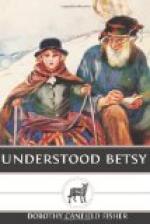Elizabeth Ann had not had the slightest idea of helping anybody with any meal, but, confronted unexpectedly with the alternative offered, she made up her mind so quickly that she didn’t want to help Cousin Ann, and declared so loudly, “Oh, help you with the supper!” that her promptness made her sound quite hearty and willing. “Well, that’s fine,” said Aunt Abigail. “We’ll set the table now. But first you would better look at that apple sauce. I hear it walloping away as though it was boiling too fast. Maybe you’d better push it back where it won’t cook so fast. There are the holders, on that hook.”
Elizabeth Ann approached the stove with the holder in her hand and horror in her heart. Nobody had ever dreamed of asking her to handle hot things. She looked around dismally at Aunt Abigail, but the old woman was standing with her back turned, doing something at the kitchen table. Very gingerly the little girl took hold of the handle of the saucepan, and very gingerly she shoved it to the back of the stove. And then she stood still a moment to admire herself. She could do that as well as anybody!
“Why,” said Aunt Abigail, as if remembering that Betsy had asked her a question. “Any man could strike a spark from his flint and steel that he had for his gun. And he’d keep striking it till it happened to fly out in the right direction, and you’d catch it in some fluff where it would start a smoulder, and you’d blow on it till you got a little flame, and drop tiny bits of shaved-up dry pine in it, and so, little by little, you’d build your fire up.”
“But it must have taken forEVER to do that!”
“Oh, you didn’t have to do that more than once in ever so long,” said Aunt Abigail, briskly. She interrupted her story to say: “Now you put the silver around, while I cream the potatoes. It’s in that drawer—a knife, a fork, and two spoons for each place—and the plates and cups are up there behind the glass doors. We’re going to have hot cocoa again tonight.” And as the little girl, hypnotized by the other’s casual, offhand way of issuing instructions, began to fumble with the knives and forks she went on: “Why, you’d start your fire that way, and then you’d never let it go out. Everybody that amounted to anything knew how to bank the hearth fire with ashes at night so it would be sure to last. And the first thing in the morning, you got down on your knees and poked the ashes away very carefully till you got to the hot coals. Then you’d blow with the bellows and drop in pieces of dry pine—don’t forget the water-glasses—and you’d blow gently till they flared up and the shavings caught, and there your fire would be kindled again. The napkins are in the second drawer.”
Betsy went on setting the table, deep in thought, reconstructing the old life. As she put the napkins around she said, “But sometimes it must have gone out ...”




